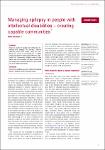Managing epilepsy in people with intellectual disabilities – creating capable communities
| dc.contributor.author | Shankar, R | |
| dc.date.accessioned | 2023-07-31T14:12:03Z | |
| dc.date.available | 2023-07-31T14:12:03Z | |
| dc.date.issued | 2023-04-28 | |
| dc.identifier.issn | 2056-4686 | |
| dc.identifier.issn | 2056-4686 | |
| dc.identifier.uri | https://pearl.plymouth.ac.uk/handle/10026.1/21099 | |
| dc.description.abstract |
<jats:title>SUMMARY</jats:title> <jats:p>Almost a quarter of people with intellectual disabilities have epilepsy. This life-long condition adversely affects their health, safety and well-being and carries an increased risk of sudden unexpected death in epilepsy (SUDEP) in this population. This commentary considers what not only health and social services but also communities and people with intellectual disabilities themselves can do to improve outcomes.</jats:p> | |
| dc.format.extent | 1-3 | |
| dc.language | en | |
| dc.publisher | Royal College of Psychiatrists | |
| dc.subject | Intellectual disability | |
| dc.subject | developmental disorders | |
| dc.subject | epilepsy | |
| dc.subject | epilepsy mortality | |
| dc.subject | sudden unexpected death in epilepsy | |
| dc.title | Managing epilepsy in people with intellectual disabilities – creating capable communities | |
| dc.type | journal-article | |
| dc.type | Editorial Material | |
| dc.type | Early Access | |
| plymouth.issue | 5 | |
| plymouth.volume | 29 | |
| plymouth.publication-status | Published | |
| plymouth.journal | BJPsych Advances | |
| dc.identifier.doi | 10.1192/bja.2023.19 | |
| plymouth.organisational-group | |Plymouth | |
| plymouth.organisational-group | |Plymouth|Faculty of Health | |
| plymouth.organisational-group | |Plymouth|Users by role | |
| dcterms.dateAccepted | 2023-03-13 | |
| dc.date.updated | 2023-07-31T14:12:03Z | |
| dc.rights.embargodate | 2023-10-28 | |
| dc.identifier.eissn | 2056-4686 | |
| dc.rights.embargoperiod | forever | |
| rioxxterms.versionofrecord | 10.1192/bja.2023.19 |


